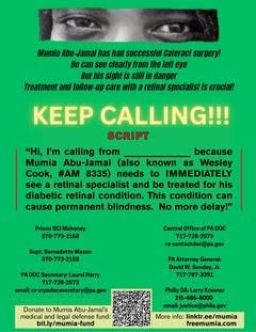Mobilizing for Mumia
By Betsey Piette
September 18, 2025

For over nine months the Pennsylvania Department of Corrections denied political prisoner Mumia Abu-Jamal the treatment he needed to reverse vision loss and prevent blindness. His eyesight had been severely diminished due to the prison’s medical neglect. But persistent and widespread pressure including phone-in campaigns to the PA DOC, a virtual press conference on Aug. 22, and a demonstration outside Mahanoy State Correctional Institute on Aug. 31, finally resulted in Mumia receiving cataract 2 laser surgery on his left eye on Sept. 2.
While Mumia reports that he is able to see better, and thanks everyone for their support, he still needs cataract 2 surgery on his right eye, and treatment for diabetic retinopathy that was diagnosed in June when his legal and medical teams secured off-site treatment with an independent ophthalmologist. The eye expert confirmed the progression of his eye disease and reported Mumia needed treatment immediately or risked permanent blindness.
At the Aug. 22 press conference, Dr. Ricardo Alvarez, Mumia’s chosen doctor explained: “In 2015, Mumia suffered a diabetic coma due to the overuse of steroids to treat severe dermatitis, which left him with undiagnosed retinal diabetes.” The condition can be treated but requires a three-month course of injections. Delaying treatment, as the PA DOC has done, clearly constitutes elder abuse. Supporters are urged to continue calling the DOC.
As the next step in securing necessary medical treatment, and elevating the political struggle to free Mumia, activists gathered at Medgar Evers College in Brooklyn, New York, on Sept. 13, with others joining the hybrid meeting via Zoom. The meeting discussed the ramifications of recent court rulings denying Abu-Jamal’s appeals, and what, if any, legal steps are still available.
Through appeals that began in 2016, attorneys for Mumia challenged the judicial bias demonstrated by former Pennsylvania Supreme Court Justice Ronald Castille, who presided over earlier appeals. They argued that Castille should have recused himself due to his past comments and actions as district attorney suggesting potential bias against defendants accused of killing police officers.
After Philadelphia Judge Leon Tucker ruled that Abu-Jamal could reargue his state appeals in December 2018, several boxes of evidence were found hidden in a storage room in the district attorney’s office.
The six boxes that were “discovered” contained credible new evidence of prosecutorial misconduct, including Brady violations based on incentives promised to the state’s key witness Robert Chobert to give false testimony. [A Brady violation refers to evidence withheld by the prosecution.]
Other evidence included handwritten jury selection notes from Assistant District Attorney Joseph McGill, at the time of Mumia’s original 1982 trial, detailing the impermissible strike pattern targeting eligible Black jurors over white jurors – a Batson violation, referring to a ruling that jurors cannot be excluded solely “on the basis of race.”
But Mumia’s petition for a new evidentiary hearing was dismissed by Philadelphia Common Pleas Court Judge Lucretia Clemons in April 2023 who claimed it was “not material” and wouldn’t have altered the jury’s verdict.
The only “legal” option open to Mumia would be to argue innocence. The Conviction Integrity Unit, created by District Attorney Larry Krasner in 2018, has overturned 40 convictions, but will only consider cases where innocence is claimed. Another prospect discussed was to reach out to the French collective which was instrumental in winning freedom for Georges Abdullah, a former Palestinian political prisoner who was imprisoned for 40 years.
Direct actions planned
Plans were initiated for two more direct actions outside SCI Mahanoy on Sept. 18 and Sept. 27, and the idea of a walk from Philadelphia to the prison in the spring of 2026 was discussed. The gathering also strategized on ways to broaden the movement through outreach to college and university students, many who are under attack by the state for activism supporting Palestine.
The informational campaign could raise Mumia’s activism as a student. At 14, he was brutalized by police when he led a march against racist presidential candidate George Wallace as he was speaking in Philadelphia. His organizing began when he tried to get his high school – Benjamin Franklin High – renamed for Malcolm X.
Each stage in Mumia’s case — from winning his release from death row to securing necessary treatments for hepatitis C and now caring for his vision problems — has relied on his supporters taking his struggle to the streets through historic international mobilizations. Things are no different today.

You must be logged in to post a comment.